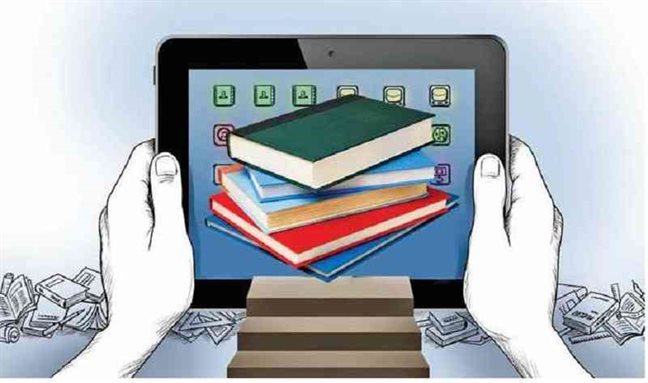Nepal Government Established E-libraries in 1456 Schools
7th March 2023, Kathmandu
An e-library, also known as a digital library, is an electronic collection of resources that are available online. And accessible through electronic devices such as computers, tablets, and smartphones.
Some e-libraries require a subscription or membership fee, while others are free and open to the public. Many e-libraries offer services such as online borrowing, digital reference services, and access to specialized collections.
Benefits of E-Library:
E-libraries have many advantages over traditional libraries, including the ability to store and preserve large collections of information in a compact and accessible format. They also provide greater access to information, particularly for users who may have difficulty physically accessing a traditional library. Additionally, e-libraries can provide faster and more efficient search capabilities, enabling users to locate relevant information more quickly and easily.
E-libraries will be established in 1456 schools this year
Under the President’s Educational Reform Program, E-Libraries will be established in over 1,400 public schools during the current fiscal year 2079/80. According to the Center for Education and Human Resource Development, 1,456 schools will operate e-libraries this fiscal year after receiving permission to establish ICT labs.
The ministerial meeting held on the 29th of August announced the list of selected schools for the current financial year. Govindraj Pokharel, Director of the Education and Human Resource Development Center’s Research and Educational Quality Branch, stated that financial transfers have already been made to the municipalities where the selected schools are located.
According to Director Pokharel, each selected school will get 650,000 rupees for setting up an ICT lab. From this, the school has to make learning management software (LMS) and an AVR system.
According to Pekharel, the school has to purchase a multi-function printer, networking, or other electrical equipment for the same amount. In addition, the schools that are selected to establish ICT labs must also arrange for an e-library.
Director Pokharel said that the ICT lab with e-library will be brought into operation so that teaching can be done through the AVR system or LMS especially when the school is closed.
“EMIS shows data about students. Likewise, through the e-library, you can access teaching and learning materials, curriculum materials, and other educational materials,” he further said, “Anyone can access the system, such as teachers, students, and parents.”
With the use of this system, even if there is an epidemic like covid, he said that the teaching work will not stop.
So far, six thousand 869 schools across the country have received grants or assistance for running ICT labs under the President’s Educational Program. From the financial year 76/77, this program has started giving support to schools for ICT labs.
FAQ
Q: What is an e-library? An e-library is an online collection of digital resources, such as books, journals, magazines, newspapers, research papers, audio and video recordings, photographs, and other types of digital content.
Q: How do I access an e-library? You can access an e-library from anywhere with an internet connection using a computer, tablet, or smartphone. You may need to create an account or have a membership to access certain e-libraries.
Q: Are e-libraries free? Some e-libraries are free and open to the public, while others require a subscription or membership fee.
Q: What are the advantages of using an e-library? The advantages of using an e-library include greater access to information, faster and more efficient search capabilities, and the ability to store and preserve large collections of information in a compact and accessible format.
Q: What are the disadvantages of using an e-library? The disadvantages of using an e-library include potential issues with the quality and accuracy of the materials available, copyright and intellectual property issues, and concerns about digital security.
Q: Can I borrow books from an e-library? Yes, many e-libraries offer online borrowing services, where users can borrow digital books for a set period.
Q: Can I access an e-library from outside the country? This depends on the e-library and its policies. Some e-libraries may restrict access to users outside of their home country, while others may offer global access.







